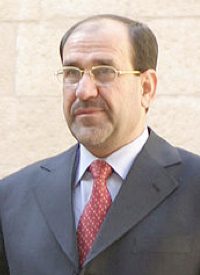
On Monday, President Obama, with Iraqi Prime Minister Nouri al-Maliki (left), announced that American forces had helped create a “new Iraq.” During a closed-door meeting after the public gathering with Maliki, Obama told reporters: “People throughout the region will see a new Iraq that’s determining its own destiny, a county in which people from different religious sects and ethnicities can resolve their differences peacefully through the democratic process.”
But the President’s comments do not square with what his own State Department and various independent watchdog groups are saying about the conditions of Christians and Jews in the “new Iraq.” On December 7, the U.S. Commission on International Religious Freedom (USCIRF) — whose members are appointed by the President and congressional leaders — sent a letter to President Obama which stated in part:
Since 2008, and most recently in May 2011, USCIRF has recommended that Iraq should be designated as a “country of particular concern” under the International Religious Freedom Act for systematic, ongoing, egregious violations of religious freedom. Despite an overall decrease in violence in the country, members of Iraq’s smallest religious minorities, including Christians, Sabean Mandaeans, and Yazidis continue to suffer from targeted violence, threats, and intimidation, against which the government does not provide effective protection. … For Iraq to become a secure and stable democracy, it must guarantee and enforce the human rights of all Iraqis, both in law and in practice [and ensure] the need for this government to protect Iraq’s most vulnerable religious minority communities, who face the threat of religious cleansing, and ensure them justice.
Last December, the commission reported: “In practice, government institutions do not acknowledge conversion from Islam for official purposes, and persons who leave Islam often face severe social persecution, including death, often by assailants known to the victims.” It noted as well that promoting “Zionist principles” or associating with “Zionist organizations” is a crime in Iraq, and that those found guilty of such a crime may be executed.
The commission also observed that the number of Christians in Iraq has plummeted since the American-led overthrow of Saddam Hussein. In 2003, that population was between 800,000 and 1,400,000; today it stands between 400,000 and 600,000. (Saddam was friendly towards Christians and even named his close advisor, Tariq Aziz,a member of the Chaldean Catholic church, Deputy Prime Minister of Iraq.) Iraq’s Jewish population of Iraq has also dropped off sharply in the last 60 years, although not especially since Operation Iraqi Freedom. There were 150,000 Jews in Iraq at the time Israel was granted statehood in 1948. By 2004 there were only 35 Jews left in Iraq, and now there are just 10 Jews (or perhaps even fewer).
While Westerners tend to focus on Jews and Christians in Iraq, until recently this ancient land has been home to many different religions — most having some historical connection to Judaism or Christianity, such as the Yezidis, the Sabean-Mandeans, and the Shabaks. Members of each of these religions have suffered atrocities at the hands of Muslim Iraqis in the last few years. Those of the Baha’i and Zoroastrian faiths — both monotheistic religions that arose in Iran and Iraq, with adherents also in America, Europe, and India — are also routinely persecuted by Muslims in the “New Iraq.”



